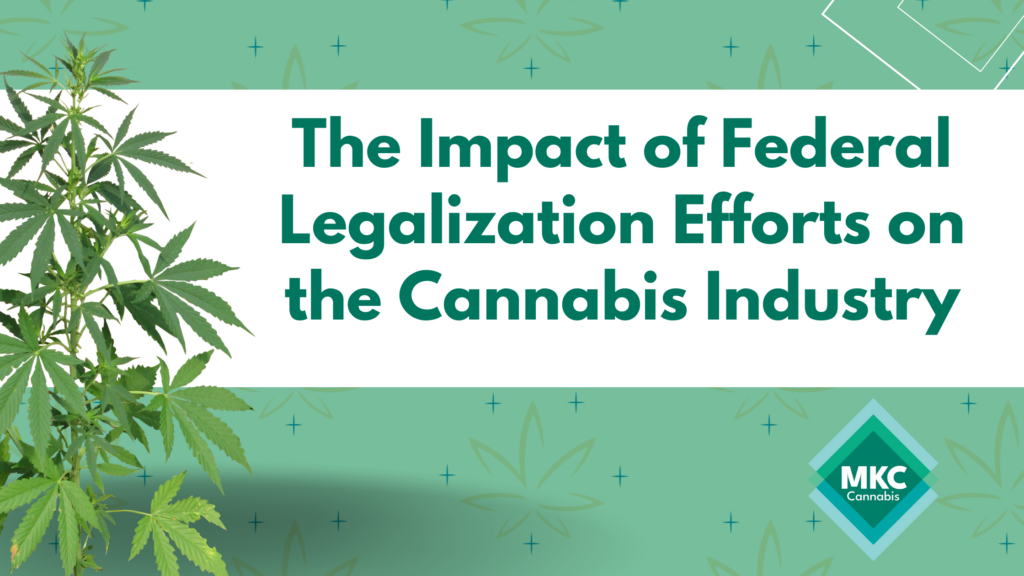Federal cannabis legalization has been a hot topic in the United States for years, with growing momentum behind efforts to decriminalize and legalize cannabis at the national level. As of 2024, the cannabis industry is experiencing rapid growth in states where it is legal, but federal prohibition continues to create challenges and uncertainties for businesses operating within the industry. In this blog, we’ll explore the potential impact of federal legalization efforts on the cannabis industry, how it could reshape the business landscape, and what cannabis entrepreneurs and stakeholders need to know.
1. Increased Access to Banking and Financial Services
The Banking Dilemma
One of the biggest challenges for cannabis businesses under federal prohibition is the lack of access to traditional banking and financial services. Because cannabis is still classified as a Schedule I drug under federal law, banks and financial institutions are hesitant to work with cannabis companies due to the risk of federal penalties.
- Cash-Only Operations: Many cannabis businesses are forced to operate on a cash-only basis, which increases security risks and complicates day-to-day operations.
- Limited Credit Options: Without access to traditional banking, cannabis businesses often struggle to secure loans or lines of credit to fund expansion and growth.
Example Quote: “Federal legalization would be a game-changer for cannabis businesses, providing access to traditional banking services and significantly reducing operational risks,” says Jane Smith, Financial Analyst at MKC Cannabis.
The Impact of Federal Legalization on Banking
If cannabis is legalized at the federal level, cannabis businesses would gain access to banking and financial services, transforming how they operate. Federal legalization would allow banks to serve cannabis companies without fear of legal repercussions, leading to:
- Access to Business Loans: Cannabis businesses could apply for loans and lines of credit, giving them the financial flexibility needed to grow and scale.
- Credit Card Transactions: Legalization would enable cannabis businesses to accept credit card payments, improving the customer experience and streamlining payment processing.
Where to Use Data: Reference reports from The National Cannabis Industry Association (NCIA) on the challenges of cannabis banking and the potential impact of federal legalization.
2. Interstate Commerce and National Expansion
Limited Market Access
Currently, cannabis businesses are restricted to operating within state lines due to federal prohibition. This means that businesses cannot transport cannabis products across state borders, limiting their market access and ability to scale. For example, a cannabis business in California cannot sell its products in neighboring states like Nevada or Oregon, even if cannabis is legal in those states.
- Fragmented Markets: The lack of interstate commerce creates a fragmented market where each state operates as a separate entity, with its own regulations and supply chains.
- Limited Expansion: Businesses are unable to expand nationally and are forced to duplicate operations in each state where they want to sell products, leading to higher costs and inefficiencies.
Example Quote: “Federal legalization would open the door for interstate commerce, allowing cannabis businesses to expand beyond state borders and build national brands,” explains Laura White, Legal Advisor at MKC Cannabis.
The Impact of Interstate Commerce
Federal legalization would remove the barriers to interstate cannabis commerce, allowing businesses to operate across state lines. This could lead to:
- National Supply Chains: Cannabis businesses could create national supply chains, reducing costs and improving product distribution.
- Cross-State Expansion: Legalization would make it easier for cannabis brands to expand into new markets, increasing their reach and revenue potential.
Where to Use Data: Reference market research from New Frontier Data to highlight the potential for growth in a federally legalized cannabis market.
3. Standardized Regulations and Compliance
The Patchwork of State Regulations
One of the biggest challenges for cannabis businesses today is navigating the patchwork of state regulations. Every state where cannabis is legal has its own set of rules governing cultivation, production, distribution, packaging, and sales. This creates a complex regulatory environment for businesses, especially those operating in multiple states.
- Varying Compliance Requirements: Businesses must comply with different packaging, labeling, testing, and advertising requirements in each state, leading to higher compliance costs and administrative burdens.
- Inconsistent Standards: The lack of standardized regulations can lead to inconsistencies in product quality and safety across state lines.
Example Quote: “The patchwork of state regulations creates a compliance nightmare for cannabis businesses. Federal legalization would streamline regulations and make it easier for companies to operate nationally,” says Kevin Green, Compliance Officer at MKC Cannabis.
Federal Legalization and Standardized Regulations
If cannabis is legalized at the federal level, businesses could benefit from more standardized regulations across states. This would create a more predictable and efficient regulatory environment, leading to:
- Unified Standards: Federal legalization could lead to the creation of national standards for testing, packaging, and labeling, reducing the complexity of compliance.
- Lower Compliance Costs: By streamlining regulatory requirements, businesses could lower compliance costs and focus on growth and innovation.
Where to Use Data: Reference regulatory trends from The Marijuana Policy Project (MPP) to discuss the potential benefits of standardized cannabis regulations.
4. Increased Investment Opportunities
Challenges in Securing Investment
Federal prohibition has made it difficult for cannabis businesses to attract investment from mainstream financial institutions and investors. The legal risks associated with investing in cannabis have led many venture capitalists, private equity firms, and institutional investors to shy away from the industry.
- Lack of Institutional Investment: Many large investment firms and hedge funds are unwilling to invest in cannabis companies due to the legal uncertainty surrounding federal prohibition.
- High-Risk Capital: The limited availability of capital means that many cannabis businesses must rely on high-risk investment sources, which can come with unfavorable terms.
Example Quote: “Federal legalization would unlock significant investment opportunities for cannabis businesses, allowing them to access institutional capital and fuel their growth,” says John Doe, Investment Analyst at MKC Cannabis.
The Impact of Federal Legalization on Investment
Federal legalization would likely lead to a surge in investment in the cannabis industry. With legal uncertainties removed, institutional investors and large financial firms would be more willing to invest in cannabis companies, leading to:
- Access to Institutional Capital: Cannabis businesses could access larger pools of capital from venture capital firms, private equity, and hedge funds, enabling them to scale quickly.
- Increased Mergers and Acquisitions: With more capital flowing into the industry, there could be an increase in mergers and acquisitions, leading to industry consolidation and the emergence of larger, national cannabis companies.
Where to Use Data: Reference investment trends from Cannabis Business Times to highlight the potential for increased investment following federal legalization.
5. Market Expansion and Consumer Access
Limited Consumer Access
Under federal prohibition, many consumers have limited access to legal cannabis, particularly in states where cannabis remains illegal. Even in states where cannabis is legal, federal restrictions can create challenges for consumers, such as limited product availability and high prices.
- Limited Availability: Without federal legalization, businesses are restricted to operating within state markets, which can limit the variety of products available to consumers.
- Higher Prices: The fragmented nature of the cannabis market leads to inefficiencies that drive up costs, resulting in higher prices for consumers.
Example Quote: “Federal legalization would expand access to legal cannabis for consumers across the country, while also driving down prices through more efficient supply chains,” explains Sarah Johnson, Market Analyst at MKC Cannabis.
The Impact of Federal Legalization on Consumer Access
Federal legalization would make cannabis more accessible to consumers across the United States, leading to:
- Increased Product Availability: With the ability to operate nationally, businesses could offer a wider range of products to consumers, increasing access to high-quality cannabis products.
- Lower Prices: The efficiencies gained from interstate commerce and standardized regulations would likely lead to lower production costs, driving down prices for consumers.
Where to Use Data: Reference consumer reports from BDS Analytics to discuss the impact of federal legalization on consumer access to cannabis products.
Preparing for Federal Legalization
The potential impact of federal legalization on the cannabis industry is immense, with benefits ranging from expanded market access and investment opportunities to standardized regulations and increased consumer access. While the path to federal legalization remains uncertain, it’s crucial for cannabis business owners to stay informed and prepared for the changes that could come. At MKC Cannabis, we specialize in helping businesses navigate the evolving regulatory landscape and develop strategies for success in a post-legalization world.
Ready to position your cannabis business for the future? Explore our compliance and strategy services and check out our portfolio to see how we’ve helped other cannabis businesses thrive. Partner with MKC Cannabis to prepare for the opportunities and challenges of federal legalization.
By working with MKC Cannabis, you gain access to expert insights and strategies to ensure your business is ready for a federally legalized cannabis market.







